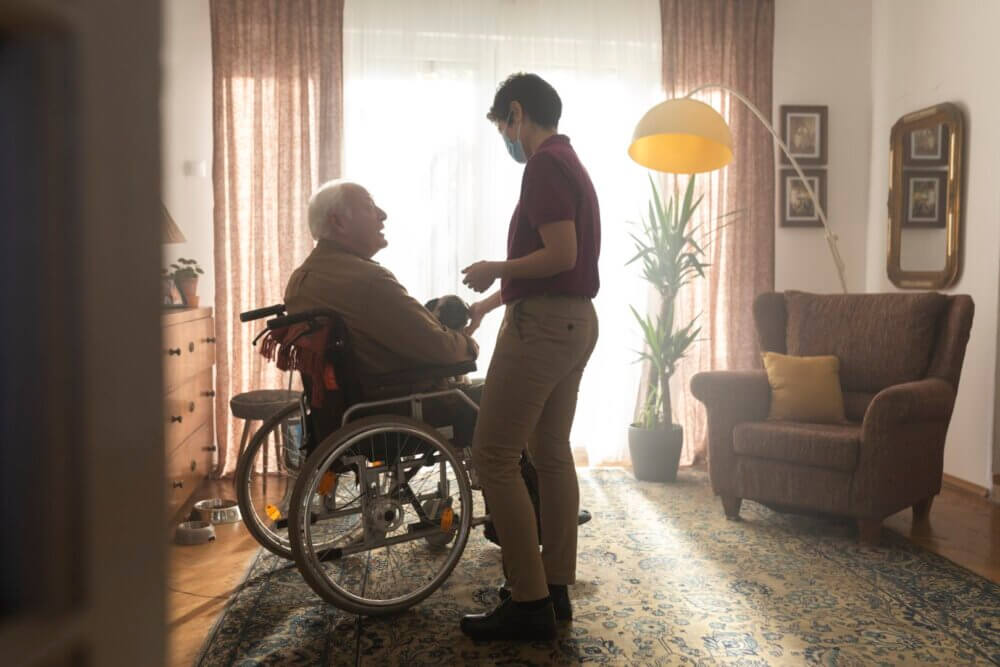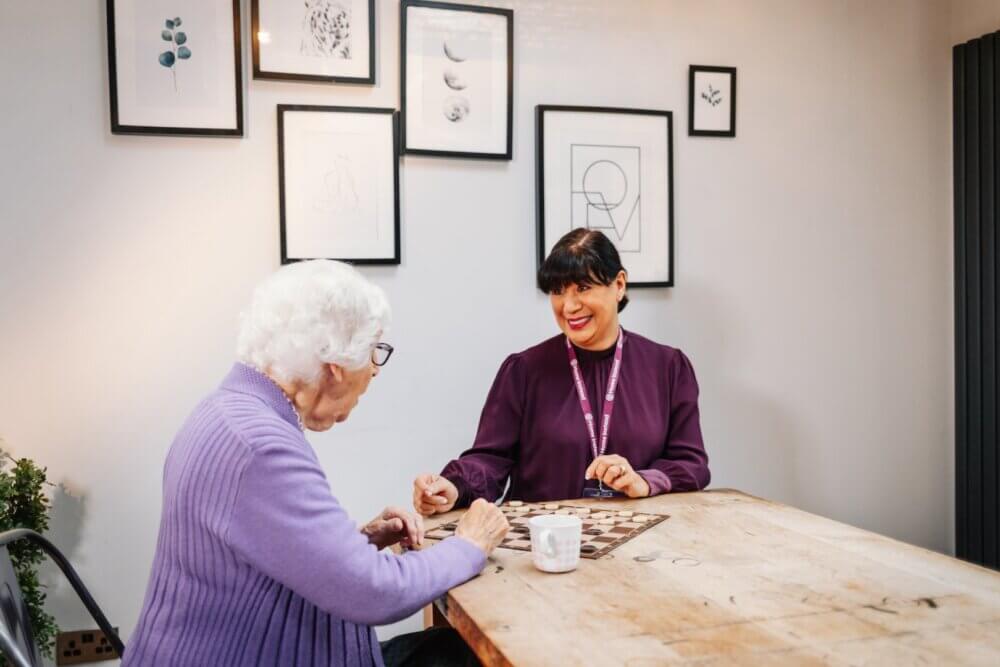Dementia Care At Home

A diagnosis of dementia doesn’t necessarily mean that someone will need to move into a residential care home. We provide exceptional care to help persons with dementia live a happy, safe, and protected life in the comfort of their own homes.
Change can be challenging for those with dementia. Enabling a person living with dementia to remain living at home, the place most familiar to them, is usually the least disruptive option.
Dementia care at home is almost always achievable with the support of properly trained Care Professionals. We have a City and Guilds accredited training programme for all our Care Professionals which is unique to us.
The training is designed to help build skills in supporting clients living with dementia and adapt the support a client may need as their dementia progresses.
There are two options to support a person living with dementia at home; hourly care and live in care.

Hourly Care
Hourly care will provide support to a client living with dementia at key times during their day.
This may range from a morning visit to help with getting a client ready for their day, at lunchtime to prepare a meal or during the evening to support a client getting ready for bed. Of course it may also be a combination of visits tailored specifically to a particular client’s needs.
A client with early stage dementia may not need support with daily living activities every day. They may simply need support to continue with hobbies and pastimes or to continue to access their community safely.
Clients may simply need support to shop once a week ro to go out to a garden centre for coffee and cake.
This type of companionship support enables the person living with dementia to become used to support from outside their family and build relationships with Care Professionals for the time their needs become more intense.

Live-in Care
Live in care offers a more intensive level of support and is a viable alternative to moving into a residential care setting.
Your live-in Care Professional will have a spare room in your home and will be there to support you each day, as much or as little as you like and according to what matters to you most.
You will determine how the care hours are used during the day to meet your needs..
Live-in carer duties can include:
- Daily living – assistance with daily tasks and personal care like bathing, dressing and toileting
- Continence care, whether it is changing incontinence pads or managing a stoma or catheter
- Medication support, including prompts or administering medication
- Support with pain management
- Help moving around the home
- Housekeeping duties, including vacuuming, dusting, changing beds, and doing the laundry
- Household tasks like Preparing meals
- Caring for your pet
- Running errands to collect prescriptions or food shopping
- Companionship and supporting your independent living at home, including accompaniment to social activities.
Care in the home by competent, professional live-in carers often provides better mental health outcomes than other care options by helping the person living with dementia to remain in a familiar environment where they feel most comfortable and safe.

What is Dementia?
Dementia is not a single disease; it’s an overall term — like heart disease — that covers a wide range of specific medical conditions, including Alzheimer’s disease.
Disorders grouped under the general term “dementia” are caused by abnormal brain changes.
These changes trigger a decline in thinking skills, also known as cognitive abilities, severe enough to impair daily life and independent function. They also affect behaviour, feelings and relationships.
Dementia is a group of symptoms. It’s caused by different diseases that damage the brain. The symptoms get worse over time and include:
memory loss
confusion and needing help with daily tasks
problems with language and understanding
changes in behaviour.
Dementia is progressive, which means symptoms may be relatively mild at first, but they get worse over time. Dementia is not a natural part of ageing. It is caused when a disease damages nerve cells in the brain.
Nerve cells carry messages between different parts of the brain, and to other parts of the body. As more nerve cells are damaged, the brain becomes less able to work properly.
Dementia can be caused by many different diseases. These diseases affect the brain in different ways, resulting in different types of dementia

Forms of Dementia
Alzheimer’s
The most common form of dementia is Alzheimer’s disease.
Alzheimer’s disease is the most common type of dementia. For most people, the first signs of Alzheimer’s are problems with their memory, thinking, language or perception.
The causes of Alzheimer’s disease are very complex, but one key part is the build-up of two substances inside the brain called amyloid and tau. When conditions in the brain aren’t right, these clump up and form tiny structures called plaques and tangles. These make it harder for the brain to work properly.
Over time the disease causes certain parts to become smaller. It also reduces the amount of important chemicals needed to send messages around the brain.
Eventually the brain struggles to cope with the damage and the person begins to have problems with memory and thinking. When it gets to the stage where these problems are making it difficult for the person to do everyday tasks that they used to do easily, this is called ‘dementia’.
Vascular Dementia
Vascular dementia is the second most common type of dementia. Common early signs of vascular dementia include problems with planning or organising, making decisions or solving problems.
There are several types of vascular dementia, including:
multi-infarct dementia
subcortical vascular dementia
stroke-related dementia
They are all a result of problems with blood supply to parts of the brain, which then become damaged.
The most common symptoms of vascular dementia during the early stages are:
problems with planning or organising, making decisions or solving problems
difficulties following a series of steps (such as when cooking a meal)
slower speed of thought
problems concentrating, including short periods of sudden confusion.
A person in the early stages may also have difficulties with their memory and their language.

Frontotemporal dementia (FTD)
The destruction of nerve cells and their connections in the frontal and temporal lobes of the brain characterises this category of illnesses. These parts of the brain are linked to personality, conduct, and language. Common symptoms all affect behaviour, personality, thinking, judgement, language, and mobility.
An individual with FTD may have:
- Changes in personality and behaviour
- Sudden lack of inhibitions in personal and social contexts
- Problems finding the correct words to say when speaking
- Movement issues such as shakiness, balance issues, and muscle spasms
Lewy Body Dementia
Dementia with Lewy bodies (DLB) is caused by Lewy body disease. Symptoms of DLB include having difficulties staying focused, experiencing delusions, and problems with movement and sleep.
In this disease, tiny clumps of proteins known as Lewy bodies appear in the nerve cells of the brain. Lewy bodies are named after FH Lewy, the German doctor who first identified them.
Lewy bodies cause a range of symptoms, some of which are shared by Alzheimer’s disease and some by Parkinson’s disease. For this reason, DLB is often wrongly diagnosed. About 1 in 10 people with dementia has DLB.
Everyone experiences dementia differently. Both DLB and Alzheimer’s disease can cause:
problems with staying focused
difficulties with making decisions
memory loss
problems with the way the person sees things around them.
However, DLB also causes symptoms that are not usually seen in Alzheimer’s disease. These include:
hallucinations
problems staying fully awake
difficulties with movement
very disturbed sleep.
Mixed dementia
Mixed Dementia is a mix of two types of dementia. Alzheimer’s disease and vascular dementia is the most common pairing.
Research shows that many people with dementia aged 80 and up had a mix of causes, such as Alzheimer’s disease, vascular dementia, and Lewy body dementia. Mixed dementia is the subject of continuing research to see how it impacts symptoms and treatments.

Home Instead Fareham & Gosport Dementia Home Care
Home Instead Fareham & Gosport offers comprehensive dementia home care services to Fareham, Gosport, Titchfield, Wickham, Lee-on-the-Solent and the surrounding areas. Our dedicated team of Dementia care professionals are equipped with specialised training and essential skills and knowledge to navigate the challenges associated with dementia care.
If you are or a loved one would like more information around the different services we offer at Home Instead Fareham & Gosport Please don’t hesitate to get in touch.
